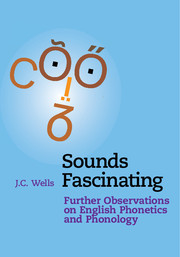1 - Unusual Words
from PART I - WORDS, NAMES, PEOPLE, AND PLACES
Published online by Cambridge University Press: 05 September 2016
Summary
Ask Your Gardener
In my garden I have a choisya – an attractive low-maintenance flowering shrub of Mexican origin. Following my parents’ example, I have always called it a ˈtʃɔɪsiə. Apparently most people call it a Mexican orange.
Its botanic name Choisya is not in any of our pronunciation dictionaries. The OED, however, gives it as either ˈtʃɔɪziə or (don't laugh) ˈʃwɑːziə, the latter recalling the name of the Swiss botanist after whom it is named, Jacques Denys Choisy ʃwazi (1799–1859).
Uncertainty and variability seem to be the norm for many botanical names in English. Their spelling is fixed (on the whole), but their pronunciation is either arbitrary or variable.
We all call a fuchsia plant a ˈfjuːʃə, even though it is named after the German botanist Leonhard Fuchs fʊks and might well therefore have been ˈfʊksiə (but isn't). The dahlia is named after the Swedish botanist Anders Dahl dɑːl, but we Brits call it a ˈdeɪliə and the Americans a ˈdæljə (or ˈdɑːljə, the swots).
I grew up calling weigelawɪˈdʒiːliə, and wrongly imagined it to be spelt correspondingly as wigelia. In fact it is named after Christian Ehrenfried Weigel ˈvaɪgl̩; in LPD I now recommend waɪˈdʒiːlə, while also mentioning several other possibilities.
Most florists seem to call gypsophilaˌdʒɪpsəˈfɪliə, though it ‘ought’ to be dʒɪpˈsɒfɪlə.
Let's not even think about eschscholzia.
Zhoosh It Up
There's a word we can agree neither how to spell nor how to pronounce: but let's list it as ʒʊʒzhoozh, as in to zhoozh something up, meaning to make more attractive, smarter, more exciting, to jazz it up.
The OED gives only the pronunciations ʒʊʃ and ʒuːʃ and the spellings zhoosh and zhush. But I think that many, perhaps most, of the people who use this word pronounce it with a final voiced consonant, ʒ. And I am not sure that I have ever heard it pronounced with uː rather than ʊ. I think the usual pronunciation is indeed ʒʊʒ, which twice violates the usual phonotactic constraints on ʒ, a consonant usually confined in English to intervocalic position, as in pleasureˈpleʒə – the phoneme ʒ doesn't normally appear at the beginning of a word, or indeed at the end of a word after a short vowel.
- Type
- Chapter
- Information
- Sounds FascinatingFurther Observations on English Phonetics and Phonology, pp. 3 - 10Publisher: Cambridge University PressPrint publication year: 2016

